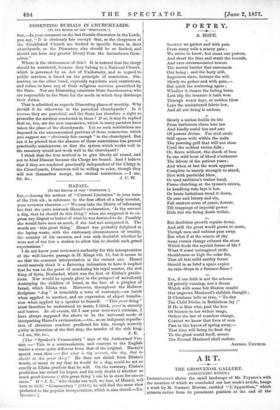HAZAEL.
[TO TSB EDITOR OF THE u SPECTATOR."] SIR,—Among the notices of "Current Literature" in your issue of the 19th ult., in reference to the first effort of a lady novelist, your reviewer observes :—" We may take the liberty of informing her that she quite misreads Hazael's exclamation, ' Is thy servant a dog, that he should do this thing ?' when she supposes it to ex- press any disgust or horror of what he was destined to do. Possibly she would have seen as much, if she had not misquoted it. The words are this great thing.' Hazael was probably delighted at the laying waste, with the customary circumstances of cruelty, the country of his enemies, and was only doubtful whether he were not of too low a station to allow him to cherish such grand expectations."
I do not know your reviewer's authority for this interpretation of the well-known passage in IL Kings viii. 13, but it seems to me that the common interpretation is the correct one. Hazael could scarcely think it a flattering intimation to have it implied that he was on the point of murdering his royal master, the sick King of Syria, Benhadad, which was the first of Elisha's predic- tions. Nor would he openly glory in the prospect of mercilessly destroying the children of Israel, in the face of a prophet of Israel, which Elisha was. Moreover, throughout the Hebrew Scripture " dog " is invariably a term of contempt,—an insult when applied to another, and an expression of abject humilia- tion when applied by a speaker to himself. "This great thing" must therefore be understood to mean, I think, great in atrocity and horror. At all events, till I saw your reviewers criticism, I have always supposed the above to be the universal mode of interpreting Hazael's exclamation,—viz., as an indignant repudia- tion of atrocious conduct predicted for him, though secretly guilty in intention of the first step, the murder of the sick king. —I am, Sir, &c., J. R. [The " Speaker's Commentary " says of the Authorised Ver- sion :—" This is a mistranslation, and conveys to the English reader a sense quite different from that of the original. Hazael's speech runs thus But what is thy servant, this dog, that he should do this great thing?' He does not shrink from Elisha's words, or mean to say that he would be a dog, could he act so cruelly as Elisha predicts that he wilL On the contrary, Elisha's prediction has raised his hopes, and his only doubt is whether so much good-fortune (' this great thing ') can be in store for one so mean." If " J. R.," who thinks too well, we fear, of Hazael, will turn to Gells' " Commentary " (1810), he will find the same view preferred to the popular interpretation, which is also stated.—En. Spectator.]


































 Previous page
Previous page